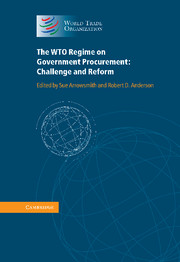Book contents
- Frontmatter
- Contents
- List of contributors
- Foreword by Pascal Lamy
- Perspective of the Chairman of the WTO Committee on Government Procurement, Nicholas Niggli (Switzerland)
- Preface
- Disclaimer
- PART I The WTO regime on government procurement
- PART II Expanding the scope of the Agreement on Government Procurement: accession and coverage
- PART III Revision of the procedural rules and other transparency provisions of the Agreement on Government Procurement
- PART IV Developing countries in the WTO procurement regime
- PART V Economic and social development (horizontal policies) in government procurement
- PART VI Enforcement and remedies
- 17 Constructing a system of challenge procedures to comply with the Agreement on Government Procurement
- 18 Designing effective challenge procedures: the EU's experience with remedies
- 19 The design and operation of a bid challenge mechanism: the experience of Hong Kong, China
- PART VII Multilateralism and regionalism
- PART VIII Challenges and new directions
- Index
19 - The design and operation of a bid challenge mechanism: the experience of Hong Kong, China
from PART VI - Enforcement and remedies
Published online by Cambridge University Press: 07 September 2011
- Frontmatter
- Contents
- List of contributors
- Foreword by Pascal Lamy
- Perspective of the Chairman of the WTO Committee on Government Procurement, Nicholas Niggli (Switzerland)
- Preface
- Disclaimer
- PART I The WTO regime on government procurement
- PART II Expanding the scope of the Agreement on Government Procurement: accession and coverage
- PART III Revision of the procedural rules and other transparency provisions of the Agreement on Government Procurement
- PART IV Developing countries in the WTO procurement regime
- PART V Economic and social development (horizontal policies) in government procurement
- PART VI Enforcement and remedies
- 17 Constructing a system of challenge procedures to comply with the Agreement on Government Procurement
- 18 Designing effective challenge procedures: the EU's experience with remedies
- 19 The design and operation of a bid challenge mechanism: the experience of Hong Kong, China
- PART VII Multilateralism and regionalism
- PART VIII Challenges and new directions
- Index
Summary
Introduction
Under the Agreement on Government Procurement (GPA), Parties are required to establish a system of challenge procedures. Of all the Parties to the GPA, Hong Kong, China (henceforth ‘Hong Kong’) presents an interesting case study as it combines the features of a clean and effective government and a highly internationalized procurement market. In this chapter, the author examines the efforts made by the Hong Kong government to implement its obligation under the GPA to provide challenge procedures. The chapter starts by reviewing the general background to the Review Body on Bid Challenges of Hong Kong. It then discusses in detail the bid challenge procedures and how such procedural rules have been applied and elaborated through the cases that came before the Review Body. The chapter concludes by noting that the bid challenge system in Hong Kong generally conforms to its GPA obligations.
The establishment of the Review Body on Bid Challenges
Introduction
As explained in chapter 17, Article XX of the GPA requires the Parties to provide appropriate procedures to enable suppliers to challenge alleged breaches of the GPA. In terms of the institutional arrangement for conducting the challenge procedures, the GPA allows the Parties to choose to have the challenges heard by either a court or some other kind of impartial and independent review body.
- Type
- Chapter
- Information
- The WTO Regime on Government ProcurementChallenge and Reform, pp. 532 - 558Publisher: Cambridge University PressPrint publication year: 2011



